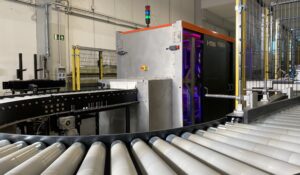In the age of automation, one of the key processes undergoing a radical transformation is sorting, or product classification. From the agri-food sector to the electronics industry, the ability to accurately and quickly sort products according to their characteristics is essential to improve efficiency, reduce costs and increase quality. Machine vision (VA) has become the technology that is leading this change, offering innovative solutions that improve traditional sorting systems.
In this article we will explore how machine vision is revolutionizing sorting in multiple industries and the challenges that remain.
Sorting and its importance in the industry
Sorting is the process of classifying products into different categories according to specific characteristics, such as size, shape, color, quality, or defects. This process is crucial in many industries, as efficient and accurate sorting directly impacts the quality of the final product, reduces waste and optimizes logistics.
For example, in the food industry, sorting is essential to separate fruits, vegetables or nuts according to their size and quality. In the electronics industry, on the other hand, parts and components must be carefully sorted to ensure that only quality products move through the production chain.
Traditionally, this process was performed by human operators, but the increasing demand for accuracy, speed and cost reduction has driven the adoption of automation technologies, particularly machine vision systems.
Machine vision: a transforming technology in sorting
Machine vision is a branch of artificial intelligence that uses cameras, sensors and algorithms to analyze and process images in real time. In the context of sorting, VA enables machines to sort products with an accuracy that far exceeds human capabilities. Through high-resolution cameras, VA systems can identify subtle features, such as imperfections or color variations, that are essential for correct sorting.
Benefits of automated sorting with machine vision
The implementation of machine vision in sorting not only improves accuracy, but also offers a number of key benefits for companies that adopt this technology:
- Increased speed and efficiency: VA systems can sort products at a much higher speed than human operators. This is especially crucial in industries with high production volumes, such as agribusiness or manufacturing. The ability to process thousands of units per hour without sacrificing quality greatly improves operational efficiency.
- Reducing errors and waste: Machine vision minimizes human error in the sorting process. The systems can detect faults or defects much more accurately than workers, which reduces the waste of defective products and improves the quality of the final product. In sectors such as the food industry, this not only optimizes economic performance, but also helps to meet stricter quality standards.
- Cost savings: By automating the sorting process, companies reduce the need for intensive labor and can minimize the time spent on repetitive tasks. This translates into long-term savings, both in wages and in the reduction of defects that can lead to financial losses.
- Scalability: As companies grow, VA systems can scale to handle higher production volumes without losing throughput. This flexibility is a great advantage, as it allows companies to quickly adapt to changes in demand or in the types of products they need to sort.
Challenges and the future of sorting with machine vision
Although machine vision offers many benefits, there are still some challenges. The initial investment in technology infrastructure, the need for trained personnel and maintenance costs are factors that companies must consider before adopting these solutions. However, advances in technology are gradually reducing these obstacles, making machine vision adoption increasingly accessible.
As artificial intelligence and machine learning systems continue to evolve, the future of automated sorting promises to be even smarter and more efficient. The ability of VA systems to learn from data and improve over time will open up new possibilities for application in even more diverse industries.
In the engineering department of i-mas we are specialized in the combination of artificial vision technologies, deep learning and industrial automation in production processes, which allows us to offer integral solutions adapted to the specific needs of each client.
Want to learn more about our services? Contact us or visit our projects section!



